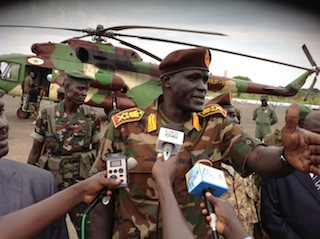South Sudan army not in regular contact with allied militia commander
May 13, 2015 (JUBA) – South Sudanese army (SPLA) on Wednesday said it was no longer making regular contacts with allied militia commander in the oil-rich Upper Nile state, prompting suspicions of games played in the matter.

A high ranking officer in the South Sudanese army told Sudan Tribune on Wednesday that the chief of general staff, Paul Malong Awan, has not been in regular contact with General Olony and stopped getting military briefings from him.
He said this happened after Major General Johnson Olony failed to comply with the directives asking him to travel to Juba as it was agreed.
“From schedules of briefings by the field commanders on security situation with chief of general staff, I noticed that Major General John Olony has not been on the schedules for some time now,” said the source.
“It is now more than two weeks and the chief of general staff has not asked any of us in the office to contact him. Also, we have not received any call from Olony, which is unusual development,” he said.
The officer, who works in the operation department within the office of chief of general staff, said Olony failed to come to the general headquarters even after he himself had given he would have gone.
Sources further speculated that General Olony might be buying time by playing the game while the government at the same time might be wanting to find a way to arrest him once in Juba.
It is said General Olony is believed to be in contact with the rebel faction led by the former vice president, Riek Machar, and that this week he sent a delegation to meet forces under the command of the rebel commander General Gabriel Tanginya, south of Malakal. But the opposition faction could not confirm the allegation.
General Garang Mabil, who is tasked with mediating the tension, told Sudan Tribune that he hoped Olony would come to Juba even though he had not kept his word, saying he might need to brief his forces.
“Olony told the committee led by comrade Mangar Buong last time when he visited Malakal that he will come after four days to Juba. He was supposed to come last Thursday. The reason he could not come was because he said he wanted to brief his forces first. I think he has now finished it and I hope he will come,” General Mabil said on Wednesday.
However, Olony himself denied in a separate interview that he was not in contact with the office of the president and general headquarters and security organs.
“I am still part of the government. I just finished talking with the office of the president. I also talk with the general headquarters. Actually there is no problem. The security situation in Malakal, as I am talking to you is calm and under control. I talk with Arkenjelo Abanga in Malakal and other SPLA commanders,” said Olony, referring to another commander of the SPLA forces who receives military instructions and orders from Juba.
Observers say Olony fears that if he surrenders to Juba he could be treated the same way General Gabriel Tanginye and General Mabor Dhoal and several officers were treated in 2011 following the Kaldak clashes between government troops and forces under their command.
His militia forces have not been integrated into the army since his return from Khartoum after independence. The clashes between his forces and government troops was sparked by the killing of his deputy in April whose death is blamed on pro-government troops and armed youth civilians hailing from the Dinka ethnic group in Upper Nile state.
He has since controlled the state capital and dislodged the state government, including the governor.
(ST)
